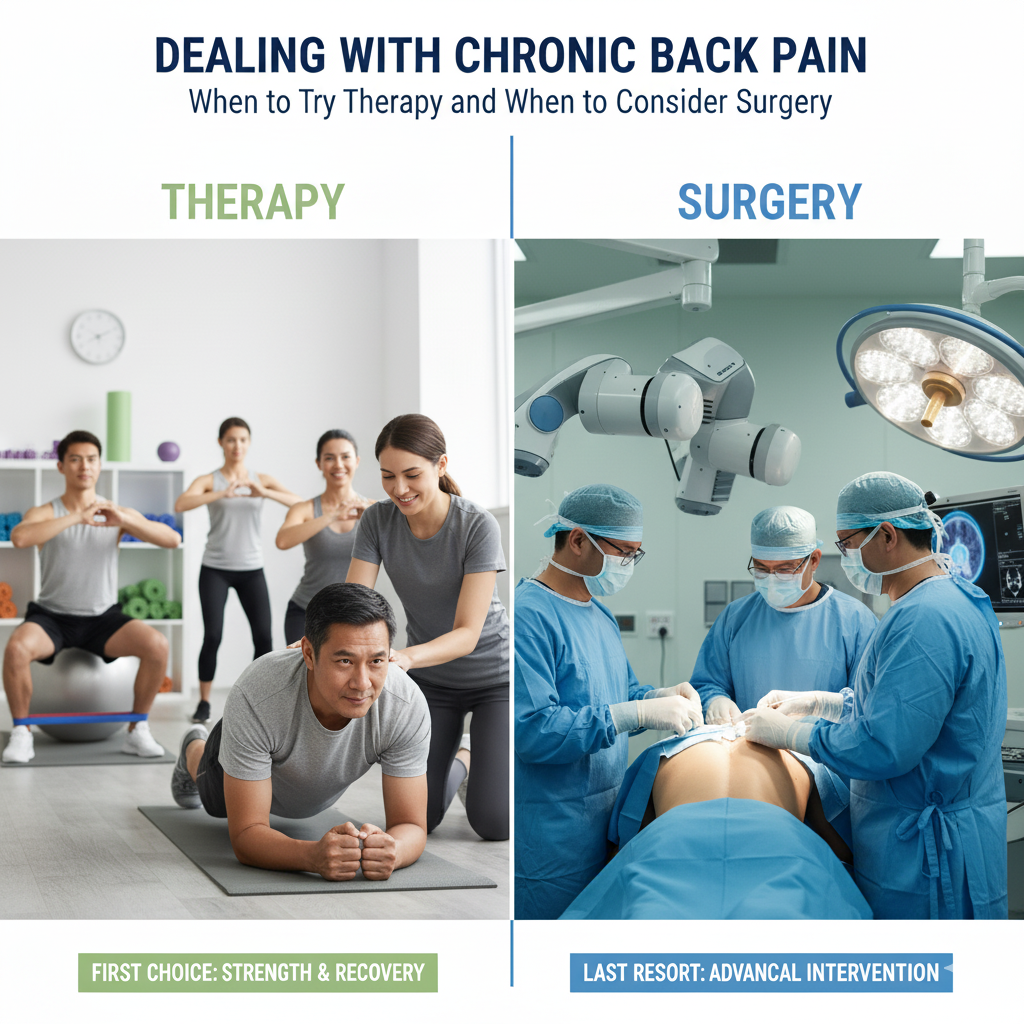Feel free to ask
Clinic Location
Besides SBI ATM, Near Bus Stop Acharya Vihar Square, Bhubaneswar
Opening Hours
Mon - Sat: 5.30pm - 9pm Sunday: Closed
Call
9439537777
Appointment

Dealing With Chronic Back Pain: When to Try Therapy and When to Consider Surgery
Chronic back pain treatment requires a careful balance between non-surgical therapy and surgical options. At OrthoOne Orthopedics Clinic, patients receive expert care to relieve persistent spine pain and restore movement. But how do you know when therapy is enough—and when surgery becomes necessary? Let’s explore the signs, treatment options, and recovery approaches guided by Dr. Dibya Singha.
chronic back pain treatment is one of the most common health problems worldwide, affecting millions of people and significantly reducing quality of life. While occasional back pain can be managed with rest, persistent or severe discomfort often requires medical intervention. The challenge many patients face is knowing when conservative treatments are enough—and when surgery may be necessary.
Common Causes of Chronic Back Pain
- Herniated or slipped discs
- Degenerative disc disease
- Spinal stenosis (narrowing of the spinal canal)
- Arthritis of the spine
- Muscle or ligament strain
- Injuries or fractures
- Poor posture or lifestyle factors
When to Start With Conservative Therapy
Most cases of back pain improve without surgery. Doctors usually recommend non-surgical therapies first, such as:
- Physical Therapy & Exercise
- Strengthens core and back muscles
- Improves flexibility and posture
- Reduces the risk of future injuries
- Medications
- Pain relievers, muscle relaxants, or anti-inflammatory drugs
- Sometimes nerve pain medications or injections
- Lifestyle Modifications
- Maintaining a healthy weight
- Ergonomic adjustments at work/home
- Regular low-impact activities like walking, swimming, or yoga
- Alternative Treatments
- Chiropractic adjustments
- Acupuncture
- Massage therapy
Therapy works best when the pain is mild to moderate, has lasted a few weeks or months, and does not cause nerve-related symptoms like numbness or weakness.
Signs That Surgery May Be Needed
Surgery is typically considered when conservative treatments fail after several months, or when symptoms worsen. You may need surgical evaluation if:
- Persistent pain lasts more than 3–6 months despite therapy
- Pain radiates down the legs or arms (sciatica or nerve compression)
- Weakness, numbness, or tingling in the limbs
- Difficulty walking, standing, or performing daily activities
- Loss of bladder or bowel control (a medical emergency)
- Spinal deformities such as scoliosis or severe instability
Common Surgical Options for Back Pain
- Discectomy – Removal of part of a herniated disc pressing on a nerve
- Laminectomy – Removing part of the vertebra to relieve spinal stenosis
- Spinal Fusion – Fusing two or more vertebrae to stabilize the spine
- Artificial Disc Replacement – Replacing a damaged disc with an artificial one
- Minimally Invasive Spine Surgery (MISS) – Smaller incisions, less recovery time
Recovery After Surgery
- Hospital stay may range from 1–5 days depending on the procedure
- Rehabilitation with physiotherapy is critical for regaining strength
- Healing time varies but most patients return to normal activities within a few weeks to months
- Lifestyle changes (exercise, posture care, weight control) remain important to prevent recurrence
Final Thoughts
chronic back pain treatment can be life-limiting, but not every case requires surgery. For many patients, physical therapy, medications, and lifestyle changes are enough to bring relief. However, if pain persists or neurological symptoms develop, surgery may be the best option for long-term improvement.

Dr Dibya Singha
Robotic Knee Surgeon
Dr. Dibya Singha Das is a highly skilled Orthopedic Surgeon specializing in joint replacement, trauma care, and minimally invasive orthopedic procedures. With extensive experience in complex surgeries, including robotic knee replacement and pelvis-acetabulum trauma, he is known for his patient-centric approach and precision. Currently practicing at OrthoOne Orthopedics Clinic, Dr. Das is committed to advancing orthopedic care through innovation, evidence-based treatment, and continuous learning.
Quick Links

Appointments
OrthoOne in Odisha – Expert Orthopedic Care, Closer to You
Angul, Balangir, Bargarh, Deogarh, Dhenkanal, Jharsuguda, Kendujhar, Sambalpur, Subarnapur , Sundargarh, Balasore, Bhadrak, Cuttack, Jagatsinghpur, Jajpur, Kendrapada, Khordha, Mayurbhanj, Nayagarh, Puri, Boudh, Gajapati, Ganjam, Kalahandi, Kandhamal, Koraput, Malkangiri, Nabarangpur, Nuapada, Rayagada
Copyright © 2025 Orthoone (Best orthopedic clinic in Bhubaneswar, Odisha) All Rights Reserved, Designed by Futurios